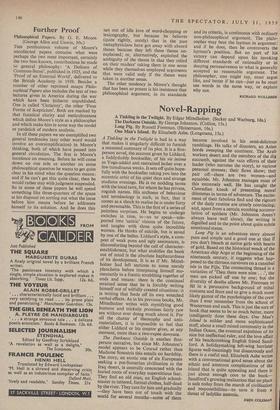Further Proof
Philosophical Papers. By G. E. Moore. (George Allen and Unwin, 30s.)
Tins posthumous volume of Moore's uncollected papers contains what were perhaps the two most important, certainly the two best-known, contributions he made to general philosophy: 'A Defence of Common-Sense', published in 1925, and the 'Proof of an External World', delivered to the British Academy in 1939. Besides a number of other reprinted essays Philo- sophical Papers also includes the text of two lectures given in America during the war which have been hitherto unpublished. One is called 'Certainty', the other 'Four Forms of Scepticism'. Both are marked by that fanatical clarity and meticulousness which define Moore's style as a philosopher and which make him in some way the model or yardstick of modern analysis.
In all these papers we see exemplified two general tendencies (any other word would involve an oversimplification) in Moore's thinking, both of which have passed into general circulation. The first is Moore's insistence on meaning. Before he will come down on one side or another on some philosophical question he wants to get quite clear in his mind what the question means: and if he can't get this quite clear, then he would rather stay with judgment suspended. So in some of these papers he will spend something like three-quarters of the space at his disposal on sorting out what the issue before him means before he addresses himself to its solution. And he does this not out of idle love of word-chopping or lexicography, but because he believes (quite rightly, surely) that in the past metaphysicians have got away with absurd theses because they left these theses un- explained; or, alternatively, exploited the ambiguity of the theses in that they relied on their readers' taking them in one sense while they themselves employed arguments that were valid only if the theses were taken in another sense.
The other tendency in Moore's thought that has been so potent is his insistence that philosophical argument, in its standards and its criteria, is continuous with ordinary non-philosophical argument. The philo- sopher may beat the layman in argument: and if he does, then he controverts the layman's position. But no part of his victory can depend upon his invoking different standards of rationality or in denying persuasiveness to what is generally accepted as reasonable argument. The philosopher, one might say, must argue like, and better if he can—just as he must use words in the same way, or explain why not.






























 Previous page
Previous page